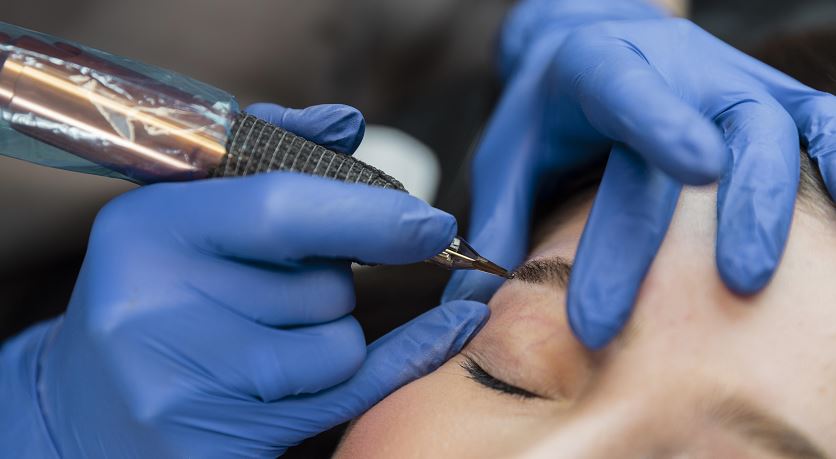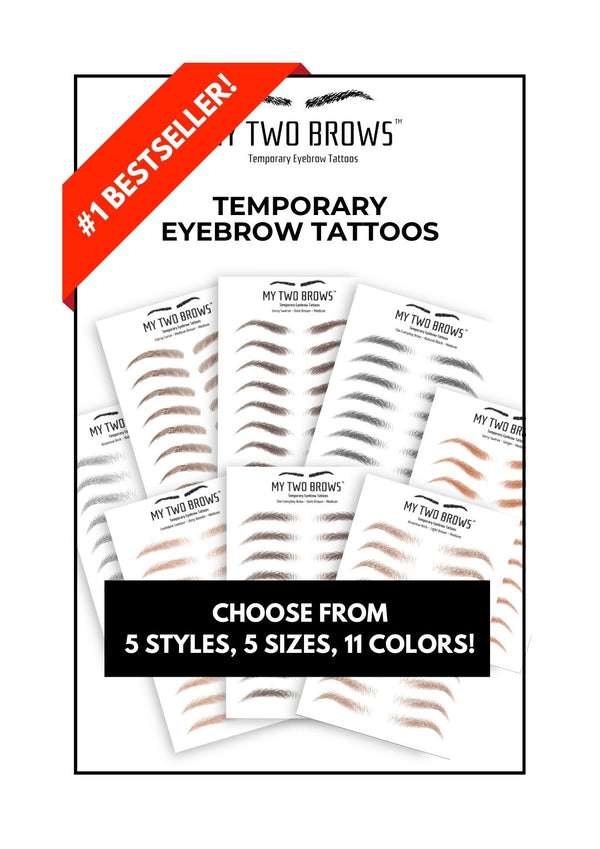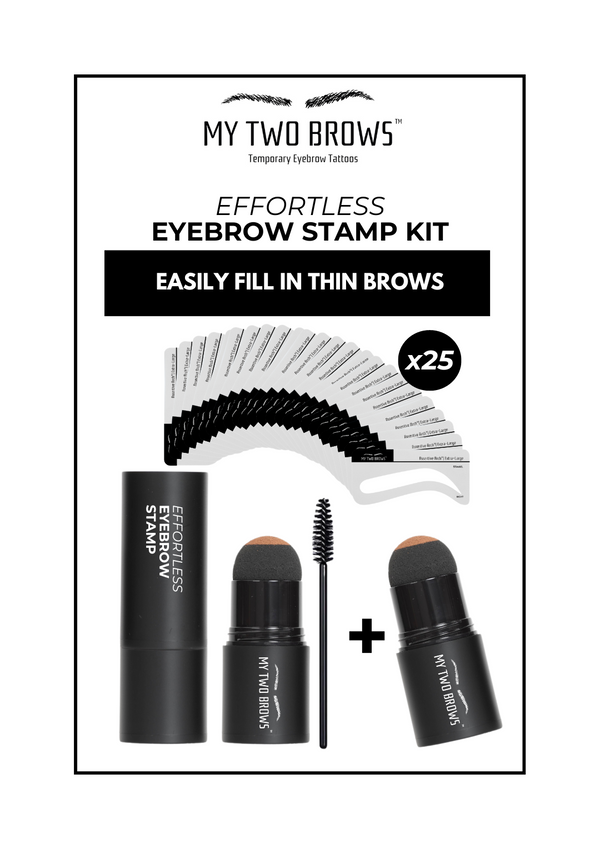
Everything You Need to Know About Microshading: The Ultimate Brow Procedure
Eyebrow stencils have become a staple for anyone looking to get back natural brows without investing in permanent eyebrow procedures. After all, it is versatile, user-friendly, affordable, and 100% pain-free. The only reason anyone would think this isn’t the tool for them is if they were looking for more long-term solutions.
If this sounds familiar, we’re here to give you the low-down on one of the industry’s most trusted semi-permanent brow procedures, microshading.
What is Microshading?

Microshading eyebrows is a semi-permanent brow procedure. It is often compared with ombre powder brows because of the stark similarities. However, microshading is often combined with microblading, which gives it an added effect consisting of hair-like strokes.
Understanding the Microshading Technique
The brow microshading process involves a professional technician who will apply pigment via a handheld tool. The pigments are administered through tiny dots, which results in a softer yet fuller, powder brow effect.
Microblading vs Microshading: Key Differences
When it comes to microshading vs microblading, there are a few key differences to note, which include their cost, frequency of touch-ups, lifespan, and how the pigment is applied.
Which Brow Procedure is Right for You?
Both microshading and microblading are semi-permanent and involve pigment administered under the skin. What it all boils down to is your preference between the end results, which we cover more in the sections below.
What is the Cost of Microshading?
The average cost of microshading ranges from $300 to $2,000. This number can go higher or lower, depending on many factors. it is important to focus more on the quality of the output and the trustworthiness of your artist rather than the cost alone. Oftentimes, prioritizing cheaper options can result in more costly remedies down the line.
Factors Influencing Microshading Prices
The actual total your microshading treatment may cost depends on the state you get your treatment done, how experienced your chosen artist is, how reputable their studio has become, the quality of the pigments and tools if they have a professional license and more.
Average Cost of Microshading Sessions For Touch-Ups
After your initial treatment, touch-ups are required to keep your brows looking full, natural, and at their best state. Each touch-up session would cost between $100 to $162, with the actual total depending once again on the several factors listed above.
Are There Additional Costs to Consider?
While the session cost is often all in, there are also other costs to consider with microshading treatments. This includes the consultation fee, additional services, and any products needed during the healing process. Additional services can include add-ons that your artist may recommend to further enhance your brows. More often than not, these can be performed together during the microshading session.
How Does Microshading Differ from Microblading?
Microshading is better than microblading for those who want a mix of dotted pigments with hair-like strokes that result in powdered, soft brows. On the other hand, microblading is the clear winner if you prefer a brow made only with swift details mimicking hair strands.
Other factors that set microblading and microshading apart include:
Cost - On average, microblading costs more than microshading.
Frequency of Touch-Ups - Though several factors can affect the frequency, microblading often requires more touch-ups. On average, microblading requires a touch-up session every 8-12 months, while microshading is maintained through a touch-up session once every 12-18 months.
Healing Process: Microshading tends to scab and peel more as it heals.
Microshading Before and After Photos
Below are great examples of before and after microshading treatments.


What Are the Side Effects of Microshading?
While generally safe, every semi-invasive procedure comes with a risk of side effects. This is especially true for those who have sensitive or oily skin, those with allergies, and those who don’t follow a proper aftercare routine.
Common Side Effects to Expect
The common side effects you can expect from microshading, even if you have normal to dry skin include:
Redness and Swelling
Despite the procedure being only minimally invasive, the use of needles to puncture the skin can still cause physical trauma to the brow area. It is expected to cause redness and swelling for the first few days to a week.
Itching and Irritation
As the brow heals, you can expect some itching and irritation. Do not scratch, rub, or pick the area as this can result in scarring. Your technician should be able to provide a soothing cream that will help lessen the effects.
Scabbing
As your skin regenerates, scabbing and flaking is bound to occur. This is a process that must be done naturally and without your peeling it off. If you do decide to peel off excess skin instead of waiting for it to fall off, the chances of scarring are maximized.
Color Degradation
Depending on the quality of the pigment used and your skin’s natural reaction, there is a chance of discoloration over time.
Allergic Reactions
While uncommon, some may experience an allergic reaction to the pigment or tools used during the procedure. It is advised to have a patch test before your appointment to ensure no further complications arise.
Infections
With needles, there is often the risk of infection. However, so long as you opt for an experienced and trustworthy artist who sterilizes their equipment, this side effect shouldn’t be something to worry about.
Scarring
Apart from scratching or peeling the area, scarring can also occur with improper technique.
How to Minimize Risks During the Procedure
There are three main ways one can minimize the risk of unnatural side effects from a microshading procedure.
Prevention Strategy #1: Know What To Avoid
For at least 24 hours before your microshading treatment, you should avoid taking blood thinners (with the go-signal from your medical doctor), alcohol, and caffeine. You should also stay clear of waxing, plucking, threading, or getting any facial treatments a week prior.
Prevention Strategy #2: Choose A Reputable Technician
It is advisable to only work with technicians who have the proper licensing and have proven to adhere to safety regulations. They should be able to provide a portfolio and use tools that have been sterilized.
Prevention Strategy #3: Protect Your Skin
Once the treatment is over, you can minimize the risk of uncommon side effects and also lessen the impact of expected side effects by following a proper aftercare routine. This includes shading your brows from direct sun exposure, keeping away from makeup and skincare products, and avoiding swimming or excessive sweating in the meantime.
When to Consult a Technician About Side Effects
In the first few days to a week, side effects such as swelling, redness, itching, and discomfort are expected. If you notice it is not getting any better, or worse, progressing, past the 7 days, it is best to consult your technician. Moreover, if you notice pus or bleeding at any point in the healing process, this is a sign of an infection and must be dealt with right away.
What is the Healing Process After Microshading?
Post-treatment, you can expect a rollercoaster of effects during the first two weeks of the microshading healing process. This is the same as any other procedure such as microblading, powder, or hybrid brows. During this time, your brow area will be at its most vulnerable state and will require a more extensive aftercare routine before settling into your new brows.
Below, we outline the day-to-day expectations, what you can expect, and signs of complications to look out for.
Understanding the Healing Timeline

Days 1-2: Swelling, Redness, and Tenderness
In the first two days, you can expect to experience swelling, redness, and tenderness along your brow line. This is completely normal and should subside by the third day. Speak to your technician about how to manage discomfort such as through a cold compress.
Days 3-4: Scabbing and Itching
Giving your skin time to regenerate during this period means allowing it to scab. It will also be very itchy, but it is important not to scratch or rub the area to prevent scarring. Instead, your technician may suggest an aftercare ointment to soothe and offer relief.
Days 5-7: Flaking
Nearing the end of the first week, your brow line will start to peel off naturally. Allow it to go about its natural process without trying to hasten or control its progress. Pulling the skin off yourself not only risks scarring, but it can also mean pulling out some of the pigment, resulting in patchy brows.
Days 8-10: Brows Turn Light
This is what’s known as the “ghosting stage” of the healing process and occurs in most if not all semi-permanent brow procedures. During this time, your skin starts to form new layers over the pigment, making it seem as though your brows are barely there. Some may also experience another round of peeling when this is one. However, hold on tight because the true, natural colors are coming.
Days 11-14: Last Few Days
Towards the end of the second week, the peeling should start to subside and it all starts to calm down.
Days 15-42: Welcome Your New Brows
In the next few weeks, your brows will appear more settled in and you should start to see the actual colors come through. Once the initial side effects have passed, you can slowly start with your skincare and makeup routine once again. We still advise minimizing exposure to sunlight and water, and excessive sweating since internal healing is still in progress.
Day 43: Schedule A Touch-Up
Your brows should be all set for a touch-up at this time. This session will fix any sparse or misshaped areas from the first session. While it is expected to have to go through the healing process again, it will be at a much more minimal level since only a limited amount of needling is done.
Signs of Proper Healing vs. Complications
You know your brows are healing properly if the initial side effect subsides in a few days to a week. However, signs of complications include pus, bleeding, prolonged redness and swelling, and unmanageable discomfort or pain. If you experience the latter, it is best to consult your technician as brow experts know how to handle these best.
What is the Best Aftercare for Microshading?
Microshading can last between 1 to 3 years. This depends on many factors such as your body’s natural reaction, if you get touch-ups in time, and if you properly followed an aftercare routine.
Essential Microshading Aftercare Tips
Aftercare routines may vary according to your skin type and your artist should be able to prescribe an accurate list of do’s and don’ts fit for your condition. As a rule of thumb, it is important to keep your brows clean, dry, and moisturized throughout the healing process.
What to Avoid After Your Microshading Session
For the first 14 days after your microshading session, it is important to avoid the following:
- Touching, scratching, or rubbing your brow area
- Getting the area wet without drying it off right away
- Swimming, saunas, jacuzzis, and excessive sweating
- Direct exposure to sunlight
- Facials, peels, and similar treatments
- Applying makeup and skincare products
How to Maintain Your Brow Color and Shape
The best way to maintain your brow color and shape is by keeping your brows healthy and moisturized, and scheduling a touch-up session when necessary.
Can Microshading Work for All Skin Types?
Microshading works well on any skin type, including oily, sensitive, and combination skin.
Microshading on Oily Skin: What You Need to Know
The main concern with brow enhancements on oily skin is that the pigment tends to fade faster due to the excess moisture. However, the technique used in microshading allows the product to set much better and last quite longer compared to other treatments.
Though generally, those with oily skin will need more frequent touch-ups compared to those with dry skin, microshading is still a good option if you need your brows to last you for about a year.
How Skin Type Affects Microshading Results
Those with oily skin experience pigment retention issues more often than those with dry, combination, or normal skin types. However, this does not mean brow procedures won’t work. It only means touch-ups may be necessary sooner.
Since microshading is administered through small dots, it is much gentler on sensitive skin. The needles also don’t go too deep into the dermis, allowing sensitive skin to heal faster.
Dry, normal, or combination skin types allow the pigment to settle in better and retain the product longer.
What Are the Best Results You Can Expect from Microshading?
Microshading is designed to give natural-looking brows that also give a soft, powdery effect. Because of the multiple tiny dots of pigment that align your brow shape, achieving a fuller volume is easy.
Before and After: Eyebrow Photos to Inspire


You’re All Set!
While eyebrow microshading can offer many benefits, including long-term results, not everyone can commit to the process. For more temporary brows that don’t need you to even step out of the house or hire a professional artist, we recommend looking to Eyebrow Stamp Kit or Temporary Eyebrow Tattoos. These work wonders for those who want instant access to naturally beautiful brows that come in different shapes, sizes, and colors to perfectly complement other facial features. For more information on products that make it easy to gain back beautiful, fuller brows, check out My Two Brows.






